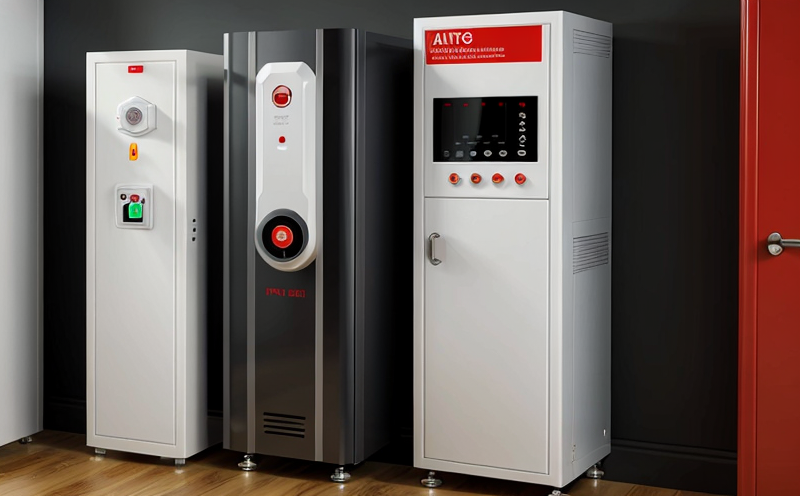Sensitivity Testing of Smoke Detectors
The sensitivity testing of smoke detectors is a crucial process in ensuring that fire detection systems are reliable and effective. This service evaluates how responsive a smoke detector is to various levels of smoke, which directly impacts the system's ability to detect fires early enough to prevent property damage and save lives.
In fire safety applications, smoke detectors play an indispensable role by providing an immediate alert when dangerous particulates are present in the air. The sensitivity test ensures that these devices meet stringent international standards such as ISO 8613-2:2005 and EN 54-7:2016, which dictate specific performance criteria for smoke detectors.
The testing procedure involves exposing the detector to a controlled environment where different concentrations of smoky particles are introduced. The test apparatus typically includes an aerosol generator capable of producing particles within a specified size range that mimics real-world smoke conditions. The exposure levels vary according to the standard, with some tests conducted at lower limits to simulate early stages of fire and others at higher limits representing more severe fire scenarios.
Once exposed, the detector's response is monitored closely for any activation signals such as sound alarms or visual indicators. A successful test confirms that the smoke detector can accurately trigger an alarm when required but not prematurely under non-dangerous conditions. This balance between sensitivity and specificity is critical in reducing false alarms while maintaining high detection rates.
For quality managers, this service ensures compliance with regulatory requirements and internal standards. Compliance officers will find value in validating their selection of certified products before deployment across facilities. R&D engineers can rely on these tests to refine product designs based on empirical data collected during sensitivity assessments. Procurement teams benefit from knowing that the detectors they source have been rigorously tested for reliability.
The importance of this test cannot be overstated, especially considering global trends towards stricter fire safety regulations and increasing public awareness about the need for robust emergency preparedness measures in buildings.
Benefits
- Enhanced Reliability: Ensures that smoke detectors consistently perform their function without false activations or failures, thereby enhancing overall system reliability.
- Regulatory Compliance: Meets international standards like ISO 8613-2:2005 and EN 54-7:2016, ensuring compliance with legal requirements for fire safety systems.
- Precise Calibration: Provides accurate calibration points that help in maintaining the integrity of detection capabilities over time.
- Risk Reduction: By identifying any shortcomings early on, potential risks associated with substandard equipment are minimized.
The outcome is a more efficient and safer built environment where occupants can feel confident knowing they are protected by dependable fire alarm systems. This service not only satisfies legal obligations but also contributes significantly to improving public safety standards worldwide.
Why Choose This Test
- Expertise: Our experienced technicians use advanced equipment and follow best practices outlined in industry guidelines to ensure accurate results.
- Precision: The testing process adheres strictly to ISO standards, guaranteeing that each test is conducted under controlled conditions for consistent outcomes.
- Comprehensive Coverage: We cover all aspects of sensitivity testing, including both low and high concentration scenarios, ensuring comprehensive evaluation of the detector's performance.
- Trustworthy Results: With years of experience in this field, we provide reliable data that can be used to make informed decisions about product selection and system upgrades.
Selecting our sensitivity testing service for smoke detectors not only guarantees adherence to international standards but also allows you to trust the reliability of your fire safety systems. Our commitment to quality ensures that every aspect of this critical component is thoroughly examined, leaving no room for doubt regarding its effectiveness in real-world applications.
Customer Impact and Satisfaction
The successful completion of sensitivity tests has a direct impact on customer satisfaction by ensuring that fire detection systems are effective and dependable. When customers can rely on their smoke detectors to function correctly, they feel safer knowing they are protected in case of an emergency.
For businesses operating within regulated environments, such as hospitals or high-rise office buildings, compliance with fire safety regulations is paramount. By choosing our sensitivity testing service, these organizations demonstrate their commitment to maintaining safe working conditions and adhering to legal requirements.
The data generated from these tests provides valuable insights into the performance of individual units, allowing for targeted maintenance schedules that extend the useful life of equipment. This proactive approach enhances customer satisfaction by preventing costly repairs or replacements due to premature failures.
Moreover, satisfied customers are more likely to recommend our services to others, fostering a positive reputation in the industry and driving long-term business relationships.





